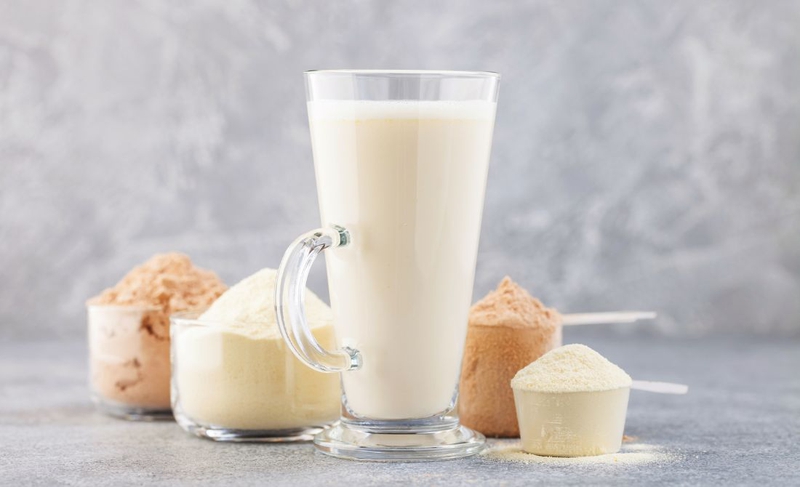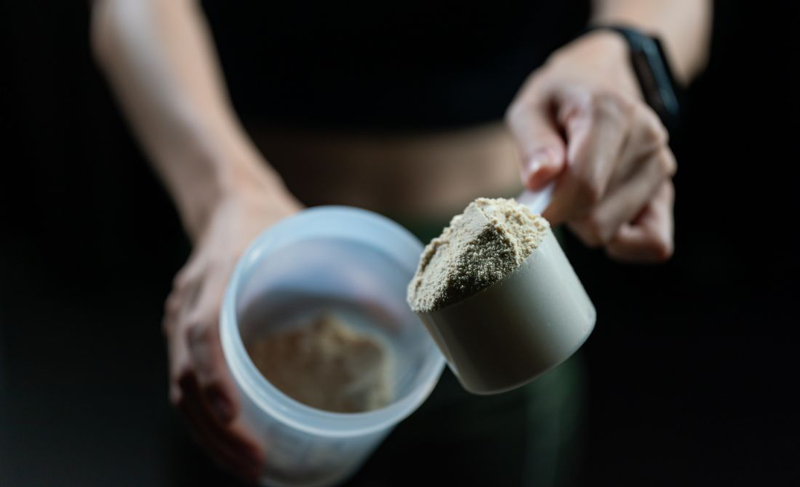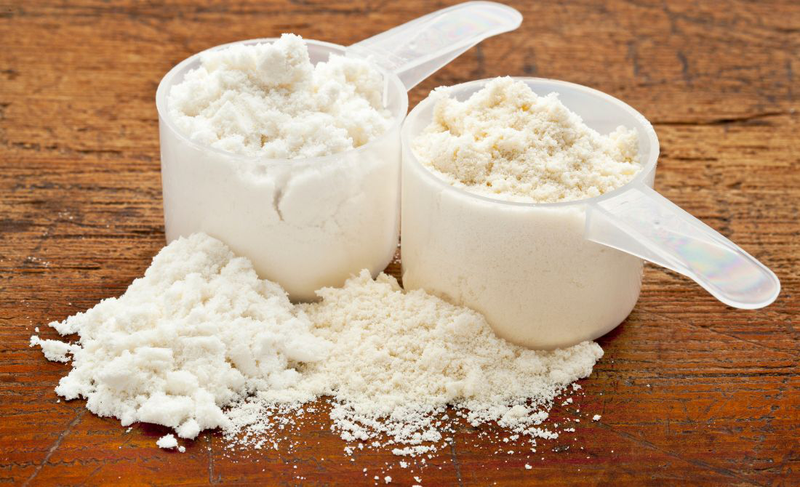Whey powder is a dairy product that has become an indispensable part of the diet of many people, especially bodybuilders. In this article, we will learn about the nutritional composition and health benefits of whey powder.
Whey powder, also known as whey protein, is a high-quality protein source, especially popular with bodybuilders. With a rich nutritional composition, whey powder not only helps build and restore muscles but also has many other uses. Let’s explore in more detail the nutritional composition and health benefits of this product.
What is whey powder? What types are there?
Whey powder is a by-product of the cheese production process. When milk is fermented to create cheese, the remaining liquid is called whey. Whey is then separated, concentrated and dried to form whey powder. There are three common types of whey powder on the market:
- Whey concentrate: This is the most common form of whey powder, containing a high amount of protein along with a small amount of lactose, fat and other nutrients. Due to the gentle processing, whey concentrate often retains much of the natural flavor of milk.
- Whey isolate or whey protein isolate: This is a purer form of whey powder, with most of the lactose and fat removed, providing the highest protein content. Whey isolate is often favored by people who want to build muscle and lose weight.
- Whey hydrolysate: This is a form of whey powder that has been hydrolyzed into shorter peptide chains, making it easier to digest and absorb quickly. Whey hydrolysate is often recommended for people with sensitive digestive systems or the elderly.

There are many different types of whey powder on the market today.
Nutritional value of whey powder
One of the bases for you to choose whey protein is the nutritional value of the ingredients in the product. Below are some common ingredients in whey and their nutritional value that you should pay attention to:
Protein in whey powder
Whey powder is a protein supplement, so this is the most important ingredient that you need to pay attention to.
- Whey concentrate: Protein content is lower than other types (about 85 – 90%).
- Whey protein isolate: Relatively high protein content (about 90 – 95%), low fat, carb and sugar content.
- Whey hydrolyzed: The highest protein content of all types (about 95%), very pure, completely filtered to remove impurities, giving the highest absorption capacity. This type has almost no fat, carb or sugar.
Amino Acid
Amino acids or amino acids are important components that make up different proteins. It plays many important roles and functions in the body’s vital activities. Amino acids are divided into two types, essential and non-essential. Whey protein can contain both. However, high-quality whey will mainly provide a high source of essential amino acids (EAAs), especially BCAAs (branched-chain amino acids).
Whey powder containing creatine
Some whey powders can provide creatine – an active ingredient that creates ATP. This ingredient has the effect of increasing the body’s energy levels, helping to increase exercise performance and endurance. Moreover, whey protein supplemented with creatine can promote stronger and more defined muscle growth.
Digestive enzymes
Digestive enzymes are also a fairly common ingredient in whey protein. They aid in the digestion process and increase the absorption of nutrients, especially protein, into the muscles. Moreover, these enzymes also limit digestive problems caused by the lactose content in some whey powders.

The nutritional composition of whey powder is extremely rich.
BCAA
Free form BCAAs are amino acids in an unbound form, which do not require digestion time. They will be absorbed through the small intestine, transferred to the blood, and run to your muscles immediately. Thanks to that, using whey powder helps to recover and repair muscle damage as quickly as possible. Some high-end whey can contain these BCAAs.
Health benefits of whey powder
With the rich nutritional composition as mentioned above, whey powder can bring health benefits such as:
Support recovery, muscle building
Whey powder contains a large amount of protein, which is the main ingredient for building and repairing muscle tissue. Protein in whey helps increase muscle strength and endurance. After exercise, muscles need to be restored. Whey provides the necessary amino acids for this process to take place quickly.
Whey powder helps lose weight effectively
Protein in whey helps you feel full longer, reducing cravings. Whey can help boost metabolism and burn calories more effectively. All of these things will help the weight loss process go more smoothly and quickly.
Whey powder helps improve the immune system
Whey contains natural antibodies that help strengthen the immune system and protect the body from disease. Some studies show that whey has anti-inflammatory effects, helping to reduce the risk of chronic diseases.

Whey powder is widely used because it brings many health benefits.
Other benefits of whey powder
In addition to the above benefits, whey powder also helps improve bone and joint health. Whey provides calcium and other minerals to help strengthen bones. Some studies show that whey can help reduce blood pressure and bad cholesterol. In addition, whey contains amino acids necessary for brain function, helping to improve memory and concentration.
How to use whey powder effectively and healthily
The effective time to use whey powder is after exercise. This is the time when muscles need to be restored and rebuilt. Drinking whey immediately after exercise will provide the necessary source of protein for this process to take place quickly. In addition, drinking whey in the morning helps provide energy for the whole day and prevents hunger. Drinking whey before bed provides protein for the body while sleeping, helping to restore muscles and grow.
The dosage of whey powder depends on many factors such as: Goals (muscle gain, weight loss), weight, level of physical activity and manufacturer’s recommendations. Typically, the recommended dosage is 1-2 scoops per serving. The simplest way to use whey powder is to mix it with cold water. You can also mix it with milk, smoothies, or add it to dishes like pancakes and yogurt to enhance flavor and nutrition.

Some people need to be more careful when choosing and using whey powder.
Some people need to be careful when using whey powder such as: People with milk allergies, patients with kidney disease, liver disease, gout, children, pregnant women, … In particular, some people have difficulty digesting lactose due to a lack of lactase enzyme (also known as lactose intolerance).
Whey concentrate powder contains a small amount of lactose, which can cause symptoms such as bloating, flatulence, and diarrhea in them. In this case, whey isolate (containing less lactose) or whey hydrolysate (hydrolyzed protein, easier to digest) can be an alternative.
Whey powder, with its rich nutritional composition, is a great addition to your diet. However, to achieve the best results, you should consult a nutritionist to choose the right whey powder and use it properly.





